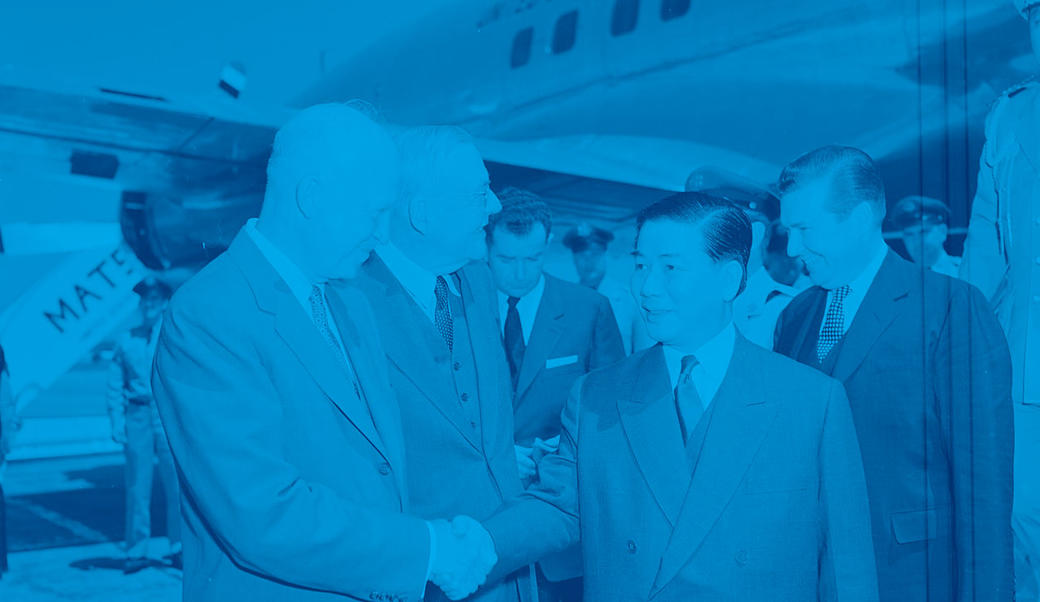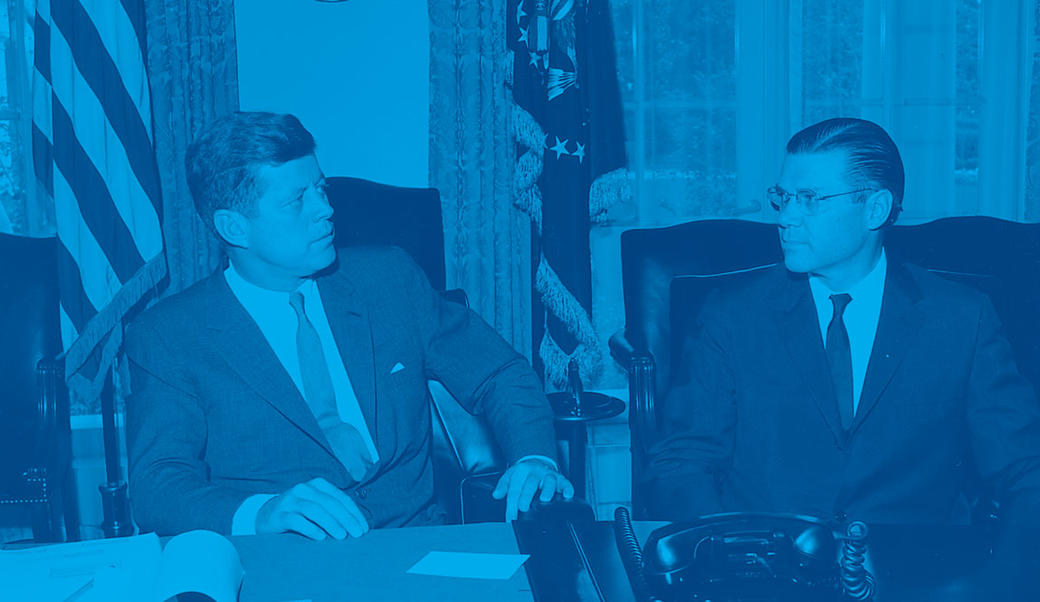John F. Kennedy: Life Before the Presidency
Born soon after America's entry into the First World War, John Fitzgerald Kennedy was the nation's first president born in the 20th century. Both parents hailed from wealthy Boston families with long political histories. His maternal grandfather had been mayor of Boston. Kennedy's father, Joseph P. Kennedy, had made a fortune in the stock market, entertainment, and other business, managing to take his money out of the stock market just before the crash of 1929. Though the ensuing Great Depression gripped the nation, “Jack” and his eight siblings enjoyed a privileged childhood of elite private schools, sailboats, servants, and summer homes. Kennedy later claimed that his only experience of the Great Depression came from what he read in books while attending Harvard University.
For John, this privileged childhood was interrupted repeatedly by chronic bouts of illness. Afflicted with an almost constant stream of ailments, several of which went undiagnosed, Kennedy spent much of his time recuperating.
In 1938, on the eve of the Second World War, President Franklin D. Roosevelt appointed Joseph P. Kennedy, John's father, to the key post of ambassador to the United Kingdom. The new ambassador was unsympathetic to British preparedness policies and found a cool reception in London. That year, Jack inherited $1 million dollars from his family, but his ambition remained strong. While in England with his father, he wrote his senior essay for Harvard University on England's lack of readiness for the Second World War. It was published and was well received by critics, becoming a bestseller under the title, Why England Slept.
World War II Military Service
After Kennedy graduated from Harvard, the United States entered World War II. His efforts to join the US Navy were initially thwarted by his ill-health, but after his father invervened, he was eventually admitted and assigned to serve in the South Pacific, commanding a small motor-torpedo boat, or “PT boat.” Kennedy and his crew participated in the campaign to wrest thousands of islands from Japanese control.
In August 1943, as the sailors were sleeping without posting a watch (in violation of naval regulations), a Japanese destroyer rammed his boat, PT 109. Towing a badly burned crewmate by a life-jacket strap clenched in his teeth, Kennedy led the crew's ten survivors on a three-mile swim to refuge on a tiny island. The crew hid on the island from the enemy for days until Kennedy managed to summon help.
Widely credited with the rescue of his crew, Kennedy received the US Navy and Marine Corps Medal for Valor and a Purple Heart for injuries he sustained. Nevertheless, he returned home to a naval inquiry on the sinking. Although a board found evidence of poor seamanship, the Navy needed heroes more than it needed scapegoats, and Kennedy was cast as the former to build public morale, and recruited to go on speaking tours.
The war ended in 1945, but not without a deep cost to the Kennedy family: the oldest son, Joseph Jr., a pilot, was killed on a bombing mission in Europe. Handsome and outgoing, Joseph had been the one tapped by his father to become president one day. Upon his death, his father's aspirations fell on John.
The Political Climb
After being discharged from the Navy, John Kennedy worked briefly as a reporter for the Hearst newspapers, and in 1946, the twenty-nine-year-old Kennedy won election to the US Congress representing a working-class Boston district. He served three terms in the US House of Representatives, earning a reputation as a somewhat conservative Democrat. He was re-elected in 1948 and again in 1950. In 1952, he ran for the US Senate and defeated the Republican incumbent from another Massachusetts family with a long political history, Henry Cabot Lodge Jr. That same year, he met Jacqueline Bouvier at a dinner party, and, as he later put it, “leaned across the asparagus and asked her for a date.” The two were married a year later and had three children, one of whom died in infancy in August 1963.
Kennedy continued to be dogged by poor health. Left thin and sallow by malaria brought home from the war in the Pacific, he also suffered from Addison's disease, which many doctors considered terminal. He relied on a steady stream of painkillers and steroids to treat the symptoms of his many ailments. Constant back pain prevented him from lifting even his own small children. Ironically, though, Kennedy's public image was one of youth, health, and vigor.
Kennedy put one period of enforced convalescence from back surgery to productive use by writing Profiles in Courage, a book about eight American senators who had taken unpopular but admirable moral stands. Benefiting also from the handiwork of Senate staffer Theodore Sorensen, the book won the Pulitzer Prize for biography in 1957.
Due to his continuing poor health, Kennedy had one of the worst attendance records in Congress. His real achievements in the Senate were few, but almost immediately after election he began angling for even higher office. In 1956, he mounted a serious quest for the vice presidential spot alongside presidential hopeful Adlai Stevenson. He narrowly lost the bid to Estes Kefauver, a senator from Tennessee.
Ultimately, though, this defeat proved a blessing. The Republican incumbents, President Dwight D. Eisenhower and Vice President Richard M. Nixon, soundly beat Stevenson and Kefauver that fall; neither Democrat would ever be a real contender for the office again. Kennedy, however, remained untarnished by Stevenson's defeat, and the exposure he got at the 1956 national Democratic convention made him a serious contender for the 1960 Democratic presidential nomination.
Reelected to the Senate in 1958, Kennedy became a member of its influential Foreign Relations Committee, which he used as a platform to attack President Eisenhower's diplomatic and military policies, claiming that the United States was on the wrong side of a “missile gap” with the Soviet Union. Kennedy continued to press these themes as he began maneuvering to get the Democratic nomination for the 1960 presidential election.




